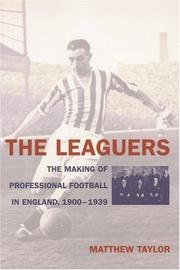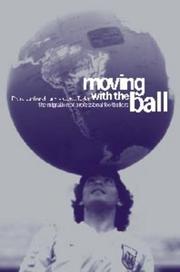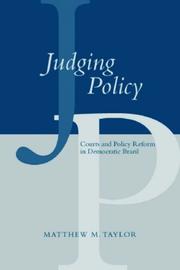| Listing 1 - 10 of 47 | << page >> |
Sort by
|

ISBN: 9781846313486 1846313481 9781781387030 1781387036 0853236399 0853236496 9780853236399 9780853236498 Year: 2005 Publisher: Liverpool Liverpool University Press
Abstract | Keywords | Export | Availability | Bookmark
 Loading...
Loading...Choose an application
- Reference Manager
- EndNote
- RefWorks (Direct export to RefWorks)
The Football Association of England has become a multi-billion pound industry. But how did English football become not only the defining sport of the nation but also one of the most successful sports in the world? With The Leaguers, football historian Matthew Taylor tells the story of the early days of professional football in England, revealing the distant origins of today's game. Making extensive use of archival materials from football clubs, unions, and associations, Taylor presents a compelling picture of football teams and players in the early days of the twentieth century, tracing the development of the system of professional teams from the hundreds of town, club, and school teams that dotted the countryside. The top tier of those teams comprised the Football League that, by the 1920s, was synonymous with the very idea of professional football in the minds of fans and sportswriters alike. The Leaguers illuminates the role played by the Football League-and by successful clubs in the League such as Arsenal and Aston Villa'as the rules, standards, and structure of the modern game were being codified. Taylor also considers the careers and influences of early players, including such well-known names as Billy Meredith, "Dixie" Dean, and Alex James. As football's popularity grew and sports media proliferated, players found themselves becoming national stars, their portraits on cigarette cards bought by fans throughout England. The first full-length history of the early days of the Football League, The Leaguers will be essential reading for football fans who want to know how their favorite sport grew from modest origins to the worldwide phenomenon that is English football today.
Soccer --- Association football --- English football --- European football --- Football (Soccer) --- Football --- History. --- Football League --- English Football League
Book
ISBN: 9780747810520 Year: 2011 Publisher: Oxford : Shire Publications,
Abstract | Keywords | Export | Availability | Bookmark
 Loading...
Loading...Choose an application
- Reference Manager
- EndNote
- RefWorks (Direct export to RefWorks)
Book
ISBN: 9780500296226 0500296227 Year: 2021 Publisher: London Thames & Hudson
Abstract | Keywords | Export | Availability | Bookmark
 Loading...
Loading...Choose an application
- Reference Manager
- EndNote
- RefWorks (Direct export to RefWorks)
COVID-induced work from home, demand for government support, changing attitudes toward paternity leave, climate change and advances in AI: these and other factors have profoundly changed our relationship to work.Work is so integral to our lives and our culture that we have internalized beliefs about its value and have built our economies and lifestyles around those beliefs. Expert Matthew Taylor reviews how the meaning, status, and structure of work have changed across history and societies. He goes on to posit that we are approaching a new era of work. He outlines some of the factors that might lead to change, including the adoption of forms of universal basic income, the growth of the zero- or low-cost economy (renewable energy, user-generated content, community mutual support), and the growth of self-employment and quasi- autonomous ways of working (including from home) in organizations. He concludes that such changes might foster a more fundamental shift: a growing intolerance of the idea of work as a burden and a desire to transform it from something imposed on us into simply the means by which we live our best lives together, recreating in modern conditions with modern resources a prehistoric unity between being and working.
Book
ISBN: 9780367229245 0367229242 9780367229252 0367229250 Year: 2020 Publisher: Abingdon, Oxon New York, NY Routledge
Abstract | Keywords | Export | Availability | Bookmark
 Loading...
Loading...Choose an application
- Reference Manager
- EndNote
- RefWorks (Direct export to RefWorks)
"Sport and the Home Front contributes in significant and original ways to our understanding of the social and cultural history of the Second World War. It explores the complex and contested treatment of sport in government policy, media representations and the everyday lives of wartime citizens. Acknowledged as a core component of British culture, sport was also frequently criticised, marginalised and downplayed, existing in a constant state of tension between notions of normality and exceptionality, routine and disruption and the everyday and the extraordinary. The author argues that sport played an important, yet hitherto neglected, role in maintaining the morale of the British people and providing a reassuring sense of familiarity at a time of mass anxiety and threat. Through the conflict, sport became increasingly regarded as characteristic of Britishness; a symbol of the 'ordinary' everyday lives in defence of which the war was being fought. Utilised to support the welfare of war workers, the entertainment of service personnel at home and abroad and the character formation of schoolchildren and young citizens, sport permeated wartime culture, contributing to new ways in which the British imagined the past, present and future. Using a wide range of personal and public records - from diary writing and club minute books to government archives - this book breaks new ground in both the history of the British home front and the history of sport"--
Sports --- Nationalism and sports --- World War, 1939-1945 --- National characteristics, British --- Social aspects --- History
Book
ISBN: 3642018815 9786613561756 1280383836 3642018823 Year: 2009 Publisher: Berlin : Springer,
Abstract | Keywords | Export | Availability | Bookmark
 Loading...
Loading...Choose an application
- Reference Manager
- EndNote
- RefWorks (Direct export to RefWorks)
In reinforcement learning (RL) problems, learning agents sequentially execute actions with the goal of maximizing a reward signal. The RL framework has gained popularity with the development of algorithms capable of mastering increasingly complex problems, but learning difficult tasks is often slow or infeasible when RL agents begin with no prior knowledge. The key insight behind "transfer learning" is that generalization may occur not only within tasks, but also across tasks. While transfer has been studied in the psychological literature for many years, the RL community has only recently begun to investigate the benefits of transferring knowledge. This book provides an introduction to the RL transfer problem and discusses methods which demonstrate the promise of this exciting area of research. The key contributions of this book are: Definition of the transfer problem in RL domains Background on RL, sufficient to allow a wide audience to understand discussed transfer concepts Taxonomy for transfer methods in RL Survey of existing approaches In-depth presentation of selected transfer methods Discussion of key open questions By way of the research presented in this book, the author has established himself as the pre-eminent worldwide expert on transfer learning in sequential decision making tasks. A particular strength of the research is its very thorough and methodical empirical evaluation, which Matthew presents, motivates, and analyzes clearly in prose throughout the book. Whether this is your initial introduction to the concept of transfer learning, or whether you are a practitioner in the field looking for nuanced details, I trust that you will find this book to be an enjoyable and enlightening read. Peter Stone, Associate Professor of Computer Science.
Computer Science --- Engineering & Applied Sciences --- Cybernetics. --- Reinforcement learning. --- Mechanical brains --- Engineering. --- Artificial intelligence. --- Computational intelligence. --- Computational Intelligence. --- Artificial Intelligence (incl. Robotics). --- Intelligence, Computational --- Artificial intelligence --- Soft computing --- AI (Artificial intelligence) --- Artificial thinking --- Electronic brains --- Intellectronics --- Intelligence, Artificial --- Intelligent machines --- Machine intelligence --- Thinking, Artificial --- Bionics --- Cognitive science --- Digital computer simulation --- Electronic data processing --- Logic machines --- Machine theory --- Self-organizing systems --- Simulation methods --- Fifth generation computers --- Neural computers --- Construction --- Industrial arts --- Technology --- Machine learning --- Reinforcement (Psychology) --- Learning classifier systems --- Control theory --- Electronics --- System theory --- Artificial Intelligence.

ISBN: 1859733077 1859733026 Year: 2001 Publisher: Oxford Berg
Abstract | Keywords | Export | Availability | Bookmark
 Loading...
Loading...Choose an application
- Reference Manager
- EndNote
- RefWorks (Direct export to RefWorks)
A consideration of the movement of football labour from the late 19th to the late 20th century, within the framework of international migration as a whole. It emphasizes the initial role of the British and the impact of the earliest South American and Yugoslav football ""wanderers"". Please note that images or diagrams have been excluded from this text due to copyright restrictions.
Emigration and immigration. --- Soccer players -- Relocation. --- Social Welfare. --- Social Sciences --- Recreation & Sports --- 796.33 <09> --- Balspelen waarin de bal gespeeld wordt met voet en hand--Geschiedenis van ... --- Geografie --- Economische geografie --- Toerisme Sport Recreatie. --- 796.33 <09> Balspelen waarin de bal gespeeld wordt met voet en hand--Geschiedenis van ... --- Balspelen waarin de bal gespeeld wordt met voet en hand--Geschiedenis van .. --- Balspelen waarin de bal gespeeld wordt met voet en hand--Geschiedenis van . --- Balspelen waarin de bal gespeeld wordt met voet en hand--Geschiedenis van
Book
ISBN: 3030640965 3030640957 Year: 2020 Publisher: Cham, Switzerland : Springer,
Abstract | Keywords | Export | Availability | Bookmark
 Loading...
Loading...Choose an application
- Reference Manager
- EndNote
- RefWorks (Direct export to RefWorks)
This book constitutes the refereed proceedings of the Second International Conference on Distributed Artificial Intelligence, DAI 2020, held in Nanjing, China, in October 2020. The 9 full papers presented in this book were carefully reviewed and selected from 22 submissions. DAI aims at bringing together international researchers and practitioners in related areas including general AI, multiagent systems, distributed learning, computational game theory, etc., to provide a single, high-profile, internationally renowned forum for research in the theory and practice of distributed AI. Due to the Corona pandemic this event was held virtually.
Artificial intelligence. --- Special purpose computers. --- Application software. --- Computers. --- Computer communication systems. --- Mathematical statistics. --- Artificial Intelligence. --- Special Purpose and Application-Based Systems. --- Computer Applications. --- Computing Milieux. --- Computer Communication Networks. --- Probability and Statistics in Computer Science. --- Mathematics --- Statistical inference --- Statistics, Mathematical --- Statistics --- Probabilities --- Sampling (Statistics) --- Communication systems, Computer --- Computer communication systems --- Data networks, Computer --- ECNs (Electronic communication networks) --- Electronic communication networks --- Networks, Computer --- Teleprocessing networks --- Data transmission systems --- Digital communications --- Electronic systems --- Information networks --- Telecommunication --- Cyberinfrastructure --- Electronic data processing --- Network computers --- Automatic computers --- Automatic data processors --- Computer hardware --- Computing machines (Computers) --- Electronic brains --- Electronic calculating-machines --- Electronic computers --- Hardware, Computer --- Computer systems --- Cybernetics --- Machine theory --- Calculators --- Cyberspace --- Application computer programs --- Application computer software --- Applications software --- Apps (Computer software) --- Computer software --- Special purpose computers --- Computers --- AI (Artificial intelligence) --- Artificial thinking --- Intellectronics --- Intelligence, Artificial --- Intelligent machines --- Machine intelligence --- Thinking, Artificial --- Bionics --- Cognitive science --- Digital computer simulation --- Logic machines --- Self-organizing systems --- Simulation methods --- Fifth generation computers --- Neural computers --- Statistical methods --- Distributed processing --- Distributed artificial intelligence

ISBN: 0804786798 9780804786799 9780804758116 0804758115 Year: 2008 Publisher: Stanford, Calif. Stanford University Press
Abstract | Keywords | Export | Availability | Bookmark
 Loading...
Loading...Choose an application
- Reference Manager
- EndNote
- RefWorks (Direct export to RefWorks)
Judging Policy analyzes the causes and consequences of the increasingly prominent role courts are being asked to play in the public policy process in Latin America's largest nation, Brazil.
Appellate courts --- Justice, Administration of --- Political questions and judicial power --- Courts of appeals --- Supreme courts --- Courts --- Appellate procedure --- Courts of last resort --- Judicial activism --- Judicial power and political questions --- Act of state --- Administrative discretion --- Judicial review --- Jurisdiction --- Law --- Rule of law --- Separation of powers --- Administration of justice --- History. --- Political aspects --- Law and legislation --- Brazil --- Politics and government
Book
ISBN: 9781108900072 9781108842280 9781108827553 1108909973 1108900070 1108904572 1108842283 Year: 2020 Publisher: Cambridge Cambridge University Press
Abstract | Keywords | Export | Availability | Bookmark
 Loading...
Loading...Choose an application
- Reference Manager
- EndNote
- RefWorks (Direct export to RefWorks)
Brazil features regularly in global comparisons of large developing economies. Yet since the 1980s, the country has been caught in a low-level equilibrium, marked by lackluster growth and destructive inequality. One cause is the country's enduring commitment to a set of ideas and institutions labelled developmentalism. This book argues that developmentalism has endured, despite hyperactive reform, because institutional complementarities across economic and political spheres sustain and drive key actors and strategies that are individually advantageous, but collectively suboptimal. Although there has been incremental evolution in some institutions, complementarities across institutions sustain a pattern of 'decadent developmentalism' that swamps systemic change. Breaking new ground, Taylor shows how macroeconomic and microeconomic institutions are tightly interwoven with patterns of executive-legislative relations, bureaucratic autonomy, and oversight. His analysis of institutional complementarities across these five dimensions is relevant not only to Brazil but also to the broader study of comparative political economy.
Economic development --- Democracy --- Development, Economic --- Economic growth --- Growth, Economic --- Economic policy --- Economics --- Statics and dynamics (Social sciences) --- Development economics --- Resource curse --- Brazil --- Politics and government
Book
ISBN: 0816680612 1452940517 Year: 2013 Publisher: Minneapolis University of Minnesota Press
Abstract | Keywords | Export | Availability | Bookmark
 Loading...
Loading...Choose an application
- Reference Manager
- EndNote
- RefWorks (Direct export to RefWorks)
| Listing 1 - 10 of 47 | << page >> |
Sort by
|

 Search
Search Feedback
Feedback About UniCat
About UniCat  Help
Help News
News